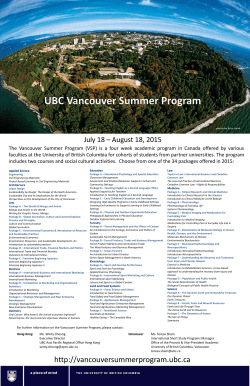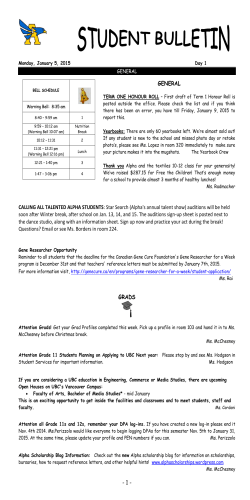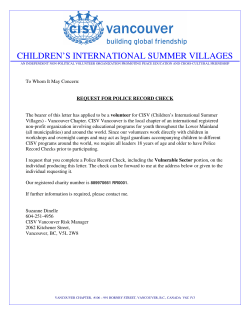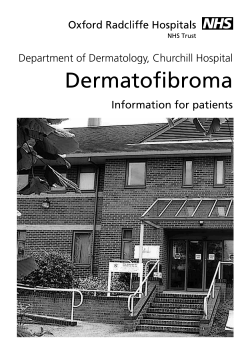
21.0 CME ON THE RUN NOV 2013 - JUN 2014
21.0 CME ON THE RUN MOC SECTION 1 MAINPRO M1 NOV 2013 - JUN 2014 VANCOUVER GENERAL HOSPITAL & VARIOUS VIDEOCONFERENCE SITES ATTEND LIVE OR BY VIDEOCONFERENCE Time: 1:00pm to 5:00pm Location: Paetzold Lecture Theratre, Vancouver General Hospital 855 West 12th Avenue, Vancouver, BC Parking: Diamond Health Care Centre Parkade (complimentary passes for VGH attendees) 2775 Laurel Street, Vancouver, BC Videoconferences Sites: Please see back page for locations 5 EASY WAYS TO REGISTER Online: www.ubccpd.ca Email: [email protected] Fax: 604-875-5078 Phone: 604-875-5101 Mail: UBC CPD 855 West 10th Avenue, Vancouver, BC, V5Z 1L7 www.ubccpd.ca FRI NOV 1, 2013 (DERMATOLOGY/ALLERGY) Hair Loss and Thinning in Women - To identify common hair loss conditions seen by family physicians To describe a practical approach to differentiate between them To prescribe appropriate treatments Discoloured and Dysmorphic Nails - To List the common causes of discoloured/dysmorphic nails seen by family physicians To describe how to manage discoloured/dysmorphic nails To recognize which ones shouldn’t be missed? Assessment and Management of Food Allergies - To describe a practical approach to "food sensitivities" gluten etc To list investigations useful in the diagnosis of “food sensitivities” “My Kid was stung and ‘reacted’...does he/she really need an EpiPen? - FRI To describe when to refer for allergy testing. To list the indications for prescribing an EpiPen. To counsel parents /patients about the risks of anaphylaxis and the use of an epipen - To develop strategies for interviewing adolescents in the office To identify the most common problems facing adolescents that FPs face in the office To become aware of the HEEADSSS approach to interviewing the adolescent To review confidentiality issues surrounding adolescence "There's something wrong with my baby's neck!" - Neonatal neck injuries - To identify congenital torticollis To distinguish between congenital torticollis and acquired torticollis To identify when torticollis is a symptom for another medical condition To counsel the parents about appropriate management strategies for congenital torticollis "Doc, my child isn't talking!" - When to worry about speech delay - To review the important speech developmental milestones To develop a strategy for assessing patients with apparent speech delay To identify the causes for speech delay To develop a strategy for the management of an identified speech delay To counsel the parents regarding the speech delay "Doc, I'm pregnant. Now what?" - An update on antenatal screening - - Vulvar Skin Conditions - To develop a strategy for the first prenatal visit To identify what tests the primary FP should be ordering before referring to a doctor who does deliveries To be able to counsel patients regarding the SIPS, IPS, NT and determine which tests to order To be aware of and utilize the perinatal guidelines set out by perinatal bc To interpret TSH according to the guidelines for pregnant women - To develop a rational approach to resistant hypertension To be able to list uncommon treatable causes of hypertension To develop a list of reserve medications and be able to prescribe them for the treatment of resistant hypertension Office Management of Chronic Renal failure - To identify which patients with renal failure to be concerned about To identify who and when to refer to the nephrologist To apply current guidelines for BP management in patients with renal failure New Anticoagulants: Which, When and How to Use - A Review of Exanthems - To describe the common exanthems seen in family practice To outline an approach to differentiate the exanthems To identify those that need immediate referral To provide possible management options “My child gets these headaches" - An approach to pediatric headaches for the family physician - To develop a strategy for diagnosing headaches in the pediatric population To identify the red flags in pediatric headaches To be aware of the management strategies for pediatric headaches To be able to counsel the parents about the need for and/or risks of Head CTs in pediatric headaches "Time for growth hormone?" - MSK Developmental Challenges - To develop an approach for the examination of a child presenting with short stature To develop an approach for the examination of a child presenting with a flat head To identify which children need referrals for their musculoskeletal concerns To be able to counsel the parents "I've had the baby - now what?" - Postpartum follow up of PIH, GDM, hypothyroidism - To develop an approach for the 1st postpartum visit To develop an approach for the management of pregancy induced hypertension in the post partum period and thereafter To develop an approach for the management of gestational diabetes in the post-partum period and thereafter To develop an approach for the management of hypothyroidism discovered in pregnancy in the post-partum period and thereafter Screening the Older Child: What to do when your patient outgrows the Rourke - To develop an approach for routine screening of the older child (age greater than 5) To discuss the evidence behind routine screening of the older child To be aware of the Greig's Health Record as a template for preventative health examinations To develop a strategy for screening for learning disorders and other developmental disorders in the older child To develop a strategy for screening for idiopathic scoliosis in the older child To list the indications for the new anticoagulants To compare the new anticoagulants to each other and to warfarin To be able to appropriately prescribe the new anticoagulants ASA, Yes or No? - Managing Fatty Liver Disease To outline the appropriate management of NASH To recognize the risks of NASH and when to be concerned To describe the current indications for treatment with ASA To compare the risk/benefit of ASA to other alternative treatments How to Manage Decompensating CHF in the Office - To outline what medications to use and how to prescribe them To describe how to best monitor CHF in an ambulatory setting To recognize the indicators for hospitalization for decompensating CHF Differentiating Early Blood Dyscrasias from the Mildly Abnormal CBC in the Office: - - To describe the common blistering diseases seen by family physicians To differentiate between them To identify those that need referral FEB 21, 2014 (INTERNAL MEDICINE) Management of Resistant Hypertension - To identify the common vulvar lesions To describe how to manage common vulvar lesions To differentiate those that need referral Blistering Diseases - FRI To be able to differentiate the good from the bad? To describe the best approach to diagnosis - punch/shave/neither? To advise patients on follow up recommendations? JAN 24, 2014 (PRENATAL/PEDIATRIC/ADOLESCENT) "Terms of Engagement" - Strategies for dealing with adolescents in the office - Moles and Melanoma To outline the initial investigations for leukopenia, thrombocytopenia and anemia To describe how to monitor over time and when to refer Peripheral Neuropathy: Making the Diagnosis. Is there any Worthwhile Treatment? - To list the differential diagnosis of peripheral neuropathy To critique the evidence for the effectiveness of different treatments of neuropathy FRI APR 4, 2014 (PSYCHIATRY) Managing Resistant Depression: Medication Combinations to Optimize Treatment - - Become comfortable prescribing anti-depressants in combination with another anti-depressant or other medication to treat resistant depression Become familiar with the indications for combining medication for treating resistant depression Know what to look out for and how to manage potential side effects of medication combinations Safe Prescribing of Psychiatric Medications: Side Effects of Which you Need to be Aware - Be able to identify important potential side effects of psychiatric medications Be able to evaluate patients for side effects and become comfortable managing them Opioid Addiction Management in the Office - Be able to identify opioid addicted patients Become familiar with resources to support management of your patients Be able to apply and support specific treatment regimes in the office Recognizing and Treating ADHD in Adults - FRI Be able to use available tools to make the diagnosis Become aware of and know how to access resources to treat your patient Become familiar with treatment options and be able to prescribe them as indicated When to test, when to treat. Appraising the best agents for uncomplicated UTI Managing recurrent or resistant UTI's and prostatitis. Which patients to watch out for. "You're Sleeping with Everyone they've ever Slept with...": Latest Recommendations for STI Screening, Diagnosis, and Treatment. - A concise update on the prevalence, diagnosis, and treatment of common STI's in BC. Practical Advice for Travellers: Prevention and Treatment of Common Problems in Foreign Lands. - - FRI Advising your patient before and during treatment. Appraising the risks and benefits of antiviral treatment for Hepatitis B and C. Assessing and interpreting symptoms during the treatment period. - Know when to discontinue bisphosphonate therapy with patients Be able to prescribe bisphosphonate therapy appropriately to the patient population who will benefit from prolonged therapy Describe the complications of long term treatment to our patients Assessment and Management of Shoulder Pain - Be able to assess the shoulder and to come up with a working diagnosis Be able to order appropriate imaging to help diagnose shoulder pain Be able to interpret and manage findings from radiographic investigations. Know Evidence Based Treatment options to offer our patients Non Red Flag Lower Back Pain - Be able to assess back pain and differentiate mechanical vs nonmechanical back pain Be able to order appropriate laboratory investigations and imaging to help aid with diagnosis Be able to treat back pain with medical and non-medical interventions Management of Plantar Foot Pain - - recognize when it is appropriate to discontinue antidepressants (i.e. resolution of symptoms, patient desire, intolerable side effects) be able to safely discontinue antidepressants become familiar with and be able to manage symptoms that accompany discontinuation Management of Personality Disorders - Be able to recognize PDs Develop skills for how to manage PD patients in the office setting Become familiar with resources for managing patients with PD Managing Anxiety in Children and Adolescents - Become familiar with screening tools and red flags for anxiety in this population (3 question screen, SCARED questionnaire, other symptoms) Become familiar with resources (including online) available for this population Identify worrisome features that should prompt referral or medication Burning Issues in Herpes Zoster Prevention and Management. - Assessing and predicting the value of vaccination in various age-groups and states of exposure. Managing the illness and its sequelae: the most effective pharmacological and non-pharmacological strategies for post-herpetic neuralgia. Battle of the Human Papilloma Virus vaccines: Current Approaches and Associated Cancers. - Current issues, including oral cancers: do current vaccines or treatments prevent oral cancers? Is there an optimal vaccine? Poverty and Immigration-Related Infectious Diseases. - Recognizing and managing the identifiable issues for inner-city, rural, and First Nations patients. "This One Bites": Insect and Tic-borne Rashes and Disease. - A slide show featuring presentations of various conditions; also, systemic disease. Managing patients convinced they have bedbugs and other parasites. JUN 6, 2014 (MSK, SPORTS MEDS, RHEUMATOLOGY) Update on Osteoporosis Treatment 2014 - Be able to recognize possible PTSD in the office Have an approach to confirm or rule out the diagnosis Be able to apply appropriate treatment approaches, including medication when indicated When and How to Discontinue Antidepressants Preventing and treating travellers’ diarrhea using Dukoral, probiotics etc. Recognizing and managing common problems of travel Recognizing, preventing, and treating mosquito-borne diseases. Long Time No "C": Hepatitis B and C treatment update. - - MAY 9, 2014 (INFECTIOUS DISEASE & TRAVEL) Optimal Office Management of UTI's and Prostatitis. - Management of PTSD Be able to teach patients conservative strategies for plantar fasciitis, metatarsalgia, morton’s neuroma. Know when surgery is indicated and the effectiveness of the procedures. Be able to counsel our patients about their chronic foot pain. Fibromyalgia – What can we do? - Be able to properly assess tender points and document their characteristics Understand the natural history of FM and be able to explain to our patients the chronic nature of the disease Be able to effectively treat their pain from a medical and non-medical approach Physical Medicine – What is their scope of practice? - Be able to differentiate between physical medicine and rheumatology roles in medicine Understand the clinical problems that Physiatrists treat and make appropriate referrals for our patients Be able to do the appropriate workup before referring to physical medicine Worrisome Fractures in the Child and Adolescent Athlete - Know which fractures in young athletes require immediate intervention and referral Understand which fractures are more commonly associated with significant morbidity both short term and long term Be able to make recommendations to stop sports related activities for our young patients following specific fracture/injury Approach to Patellar Pain - - Be able to properly assess patellar pain Understand common diagnoses of patellar pain: chrondromalacia patellae (Runner’s knee), patellofemoral pain syndrome, prepatellar bursitis (Housemaid’s knee), patellar subluxation/dislocation Be able to manage patellar pain in our office medically and non-medically FEES: (See Front Page for 5 Easy Ways to Register!) All 6 sessions @ VGH One Day @ VGH Online Fax/Phone/Onsite $369 $409 $89 $99 Online/Fax/Phone/Onsite All 6 Sessions Videoconference $59 $354 Residents/Students (VGH or Videoconference) $49 $199 VIDEOCONFERENCE SITES: Castlegar and District Health Centre 709 - 10th Street, Castlegar, BC V1N 2H7 Penticton Regional Hospital 550 Carmi Ave., Penticton, BC V2A 3G6 Kelowna General Hospital UBC SMP Clinical Academic Campus 2312 Pandosy St., Kelowna, BC V1Y 1T3 Port Hardy Hospital 9120 Granville St., Port Hardy, BC V0N 2P0 Kootenay Boundary Regional Hospital 1200 Hospital Bench, Trail, BC V1R 4M1 Kootenay Lake Hospital 3 View St., Nelson, BC V1L 2B1 Lions Gate Hospital 231 E. 15th St., North Vancouver, BC V7L 2L7 Mission Memorial Hospital 7324 Hurd St., Mission, BC V2V 3H5 Nanaimo Regional General Hospital 1200 Dufferin Crescent Nanaimo, BC V9S 2B7 Royal Columbian Hospital 330 E. Columbia St., New Westminster, BC V3L 3W7 Royal Inland Hospital 311 Columbia St., Kamloops, BC V2C 2T1 Surrey Jim Pattison Outpatient Care & Surgical Centre 9750 140th St., Surrey, BC, V3T 0G9 University Hospital of Northern BC 1475 Edmonton St., Prince George, BC V2M 1S2 Royal Jubilee Hospital 1952 Bay St., Victoria, BC V8R 1J8 UBC Continuing Professional Development | 855 W 10th Ave. Vancouver BC V5Z 1L7 T 604.875.5101 | F 604.875.5078 | [email protected] | www.ubccpd.ca CME ON THE RUN Nov 2013 - Jun 2014 ME8731 Vancouver General Hospital & Various Videoconference Sites CONTACT DETAILS Dr. Mr. Ms. Urban Last Name Rural Given Name(s) Address City Prov/State Telephone Fax Postal Code Email (required) CONFERENCE FEES: incl. course materials, lunch & refreshments @VGH One Day Fax/ Online Phone Physicians/Allied Health Professionals $89 Residents/Students provide proof of status onsite $99 All Six Sessions Online Fax/Phone $369 $409 $99 $199 $59 $49 N/A $59 Videoconference participants will receive copies of handouts via email. In order to access certificates of attendance, registrants will be required to go online to indicate record of attendance after the event has taken place. Instructions will be provided via email also. VGH NO Lunch VGH Lunch Videoconference Nov 1, 2013 Jan 24, 2014 Feb 21, 2014 Apr 4, 2014 May 9, 2014 Jun 6, 2014 I am a: Family Physician/General Practitioner $49 Videoconference+ +please indicate location below On-Site Videoconference Sites: Castlegar Surrey Kelowna Prince Nelson George Mission Victoria Nanaimo Port Hardy Kamloops North Penticton Vancouver Trail New Westminster Specialist Other Are you a fellow of the Royal College of Physicians and Surgeons of Canada (RCPSC)? Yes No If yes, please list your specialty: Personal Information is collected on this registration form pursuant to section 26 of the Freedom of Information and Protection of Privacy Act, RSBC 1996 c. 165. Information is used for the purposes of facilitating the conference and collecting aggregate statistics. UBC CPD publishes a participant list for the course that includes the participant’s name and city. Please check the box below if you DO NOT wish to have DIETARY REQUIREMENTS / ALLERGIES: Severity: HIGH or LOW, foods can be in the same room, but well labeled your information included on the participant list: I DO NOT CONSENT to being on the participant list PAYMENT $ VISA MC TOTAL AMOUNT ENCLOSED All participants registered for UBC CPD courses are included on the mailing list for future programs. If you DO NOT wish to have UBC CPD course brochures mailed to you, please indicate below. Credit Card Number Expiry Date Name of Cardholder Signature *No refunds or transfers, unless you cancel ten business day before the conference date for a fee $50 (or $25 charger per session). I DO NOT wish to be on the UBC CPD mailing list
© Copyright 2026











